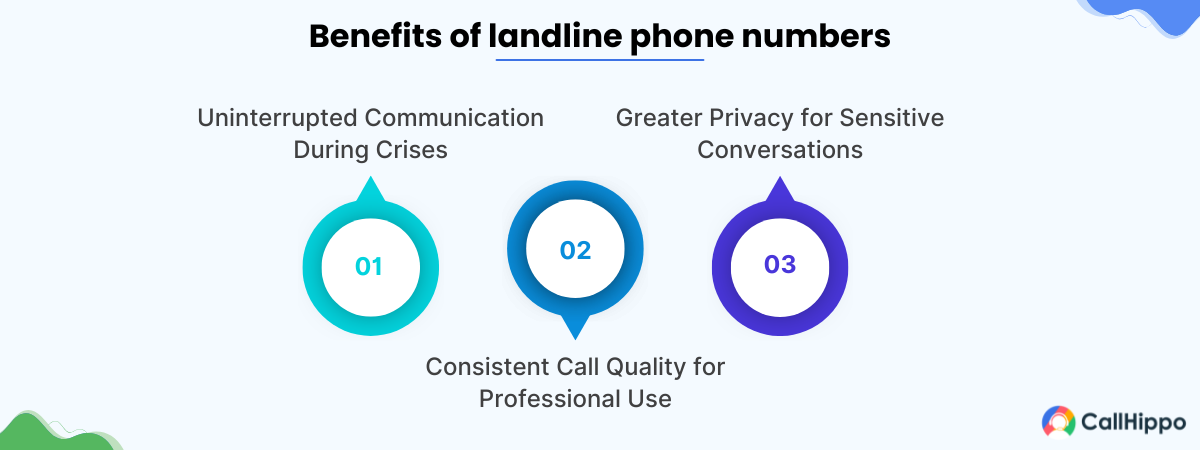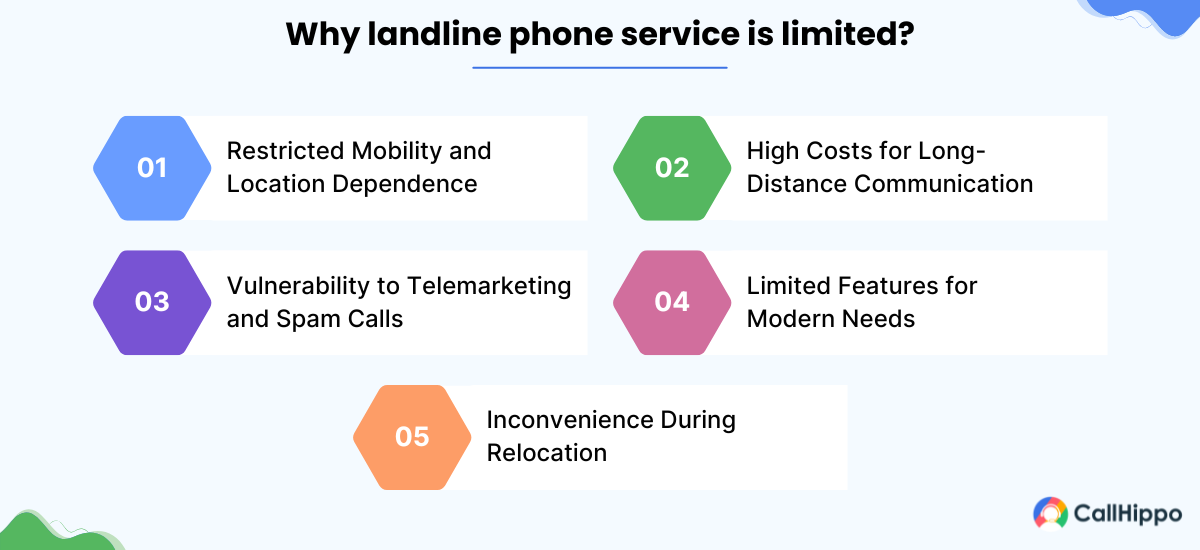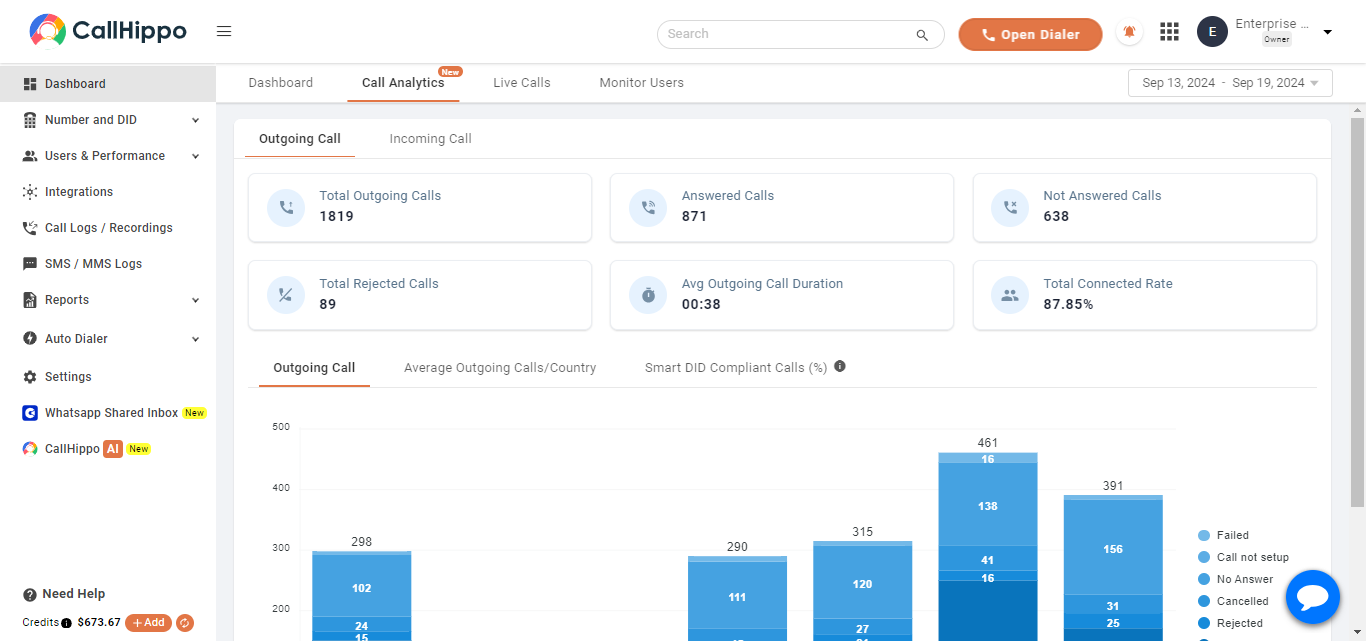eed immediate access to communication serEffective communication is the key to building strong personal and professional relationships. For decades, landline phone numbers have been a trusted means of staying connected. However, as technology evolves, so do our communication needs.
Enter VoIP (Voice over Internet Protocol)—a game-changer that offers cost savings, flexibility, and advanced features that traditional landlines simply can’t match.
In fact, 31% of businesses have already made the switch to VoIP to streamline operations and enhance connectivity (Source). So, is it time to move beyond landlines? Let’s dive into their benefits, limitations, and why VoIP is the future of communication.
What is a Landline Phone Number?
A landline phone number refers to a telephone connection that operates through a fixed network of copper or fiber-optic cables. Serving as the foundation of traditional communication, landlines have been widely used in homes and offices for decades. Unlike mobile phone numbers, which offer portability, landline numbers are tied to specific physical locations. They ensure reliable connectivity, making them a dependable choice for businesses and households that prioritize stable, uninterrupted communication.
How Does a Landline Number Work?
Landline numbers rely on the public switched telephone network (PSTN) to transmit voice signals through physical cables, ensuring consistent and reliable communication.
1. Signal Transmission to the Exchange:
When a call is made, the phone sends an electrical signal to the nearest local exchange office.
2. Routing Through Interconnected Lines:
The exchange processes the signal and directs it through a network of interconnected lines to the recipient’s location.
3. Call Completion:
The receiver’s phone rings, creating a complete circuit for two-way communication.
This straightforward mechanism guarantees dependable service, even in areas with limited mobile connectivity.
3 Advantages of Landline Phone Numbers
Landline numbers provide reliable and consistent communication, making them ideal for critical and professional use. Their secure connection ensures privacy and minimizes the risk of disruptions.

1. Uninterrupted Communication During Crises
Landline phone numbers offer a reliable communication method during power outages or emergencies since they are not dependent on electricity. Unlike mobile networks, which can experience congestion during high traffic, landlines provide consistent connectivity, ensuring you can reach emergency services or loved ones when needed most.
The types of landline phone services available, like traditional copper wire or fiber-optic, further enhance reliability, ensuring you’re not left without contact in critical times.
2. Consistent Call Quality for Professional Use
Landline phone numbers are renowned for delivering exceptional call quality, offering crystal-clear audio and minimal call drops compared to mobile or VoIP services. This reliability is perfect for businesses that prioritize seamless communication with clients and partners.
Whether utilizing traditional or advanced types of landline phone services, such as digital landlines, you can count on uninterrupted conversations. Additionally, landlines are less prone to unwanted calls, ensuring a professional and dependable communication experience.
3. Greater Privacy for Sensitive Conversations
Landline phone numbers provide a higher level of security and privacy than mobile phones or VoIP systems. With fewer vulnerabilities to hacking or eavesdropping, landlines are a safer channel for confidential business or personal conversations.
The physical infrastructure of landline phone services, including the copper wire connection, provides a stable, closed system, reducing the risk of unauthorized access. For sensitive matters, landline phones remain one of the most secure communication options available.
5 Limitations of Landline Phone Service
While landline phone services have been reliable for decades, they come with limitations in today’s tech-driven world. With restricted mobility, high long-distance costs, and a lack of advanced features, landlines are no longer the ideal solution for everyone, making it harder for individuals and businesses to meet modern communication needs.

1. Restricted Mobility and Location Dependence
Landline phone service keeps users confined to a specific location, making it less practical for those who require communication on the go. Unlike mobile phones that rely on cell towers to provide connectivity virtually anywhere, landlines are tied to the home or office. This lack of mobility can be a disadvantage in today’s fast-paced, highly connected world where flexibility is key. This is one of the reasons why fewer households are having a landline than ever before.
2. High Costs for Long-Distance Communication
Landline phone service can become costly for long-distance or international calls, with charges often much higher than modern communication methods like VoIP or mobile networks. While internet-based services allow global calls for little to no cost on mobile phone usage, landlines charge based on distance. This makes them less cost-effective for businesses or individuals who regularly communicate across regions.
3. Vulnerability to Telemarketing and Spam Calls
Landlines are often targeted by telemarketers and spam calls, which can disrupt daily communication and annoy users. Unlike mobile phones with advanced spam-blocking features, traditional landline systems offer limited protection against unsolicited calls. This can lead to frequent interruptions, making landline services less convenient for users who want to avoid such nuisances.
4. Limited Features for Modern Needs
Landlines are limited in terms of functionality compared to modern communication technologies. They lack advanced features such as video calling, call analytics, or seamless integrations with business tools like CRM systems. This makes them less suitable for businesses or individuals who rely on dynamic communication methods and comprehensive phone call management features in the modern digital era.
5. Inconvenience During Relocation
Moving a landline phone service to a new location can be an inconvenient and costly process. Unlike mobile or VoIP services that allow quick transitions, relocating a landline often requires scheduling installation, additional setup fees, and potential service outages. This adds extra time and expense to the process, making landlines less desirable for those who relocate frequently or need immediate access to communication services.
VoIP vs. Landline Comparison Table
VoIP (Voice over Internet Protocol) has revolutionized the way we communicate by offering a more flexible and cost-effective solution compared to traditional landlines. Here’s a detailed comparison of both communication technologies:
| Feature | Landline | VoIP |
|---|---|---|
| Cost | High, especially for long-distance calls | Low, especially for long-distance and international calls |
| Features | Limited (basic calling features) | Advanced (video calls, call analytics, voicemail to email, integrations) |
| Mobility | Location-dependent (fixed to one place) | Accessible anywhere with an internet connection |
| Maintenance | Complex (requires physical infrastructure) | Easy (managed through software and internet) |
1. Cost
Landlines are expensive, especially for long-distance and international calls, due to infrastructure and distance-based pricing. VoIP, however, is more affordable, using the internet for calls, which lowers the cost, especially for international communication. Many VoIP providers offer low-cost packages with unlimited local and international calls.
2. Features
Landlines offer basic features like voice calling and voicemail. In contrast, VoIP provides advanced features such as video calls, call analytics, voicemail to email, call forwarding, and integrations with business tools, enhancing communication for both personal and business use.
3. Mobility
Landlines are location-dependent, limiting use to one fixed place. VoIP technology allows you to make calls anywhere with an internet connection, whether at home, in a café, or while traveling, offering more mobility and convenience.
4. Maintenance
Landlines require the maintenance of physical infrastructure like copper wires, which can be costly and complex. VoIP, on the other hand, is easier to maintain, as it operates via the internet and is managed remotely by the service phone company, requiring minimal upkeep.
Case Study: How Intech Improved Communication with CallHippo
About Intech
Intech, a leading IT services company, needed a cost-effective, scalable telephony solution to enhance communication across its global teams and clients.
Challenges
Their existing phone system lacked flexibility, making it difficult to manage international calls efficiently. Intech required a VoIP solution with features like call recording, analytics, and seamless CRM integration.
Solution & Results
By switching to CallHippo, Intech gained a flexible VoIP system with advanced features such as call tracking, IVR, and real-time analytics. This improved team collaboration, reduced communication costs, and enhanced customer interactions. The easy setup and user-friendly interface helped Intech streamline global operations, making CallHippo an essential part of their workflow.
Switch to CallHippo VoIP: The Smart Choice for Your Business

Switching to CallHippo VoIP significantly reduces communication costs by using the internet for calls, offering affordable rates, especially for long-distance and international calls. This allows businesses to cut down on their operational expenses while maintaining high-quality service. Let’s look at the benefits in detail:
1. Cost Efficiency
Switching to CallHippo VoIP can significantly lower operational costs. Traditional telephone services are often expensive, especially for long-distance or international calls. VoIP uses the internet, which offers cheaper rates, enabling businesses to reduce communication expenses while maintaining high-quality connections.
2. Global Presence
With CallHippo, you can acquire virtual phone numbers from over 50 countries. This allows businesses to establish a local presence in international markets without needing physical offices, fostering trust and convenience with customers across the globe.
3. Advanced Features
CallHippo offers a wide range of advanced features like call forwarding, call analytics, and CRM integrations. These tools help businesses manage calls more effectively, track performance, and streamline customer interactions, improving overall productivity and customer satisfaction.
4. Scalability
CallHippo’s VoIP system is highly scalable. As your business grows, you can easily add or remove users without complex setup processes or additional hardware. This flexibility ensures that your communication system evolves alongside your business needs.
5. 24/7 Support
CallHippo offers 24/7 customer support to ensure uninterrupted communication. Whether you encounter technical issues or need assistance with the platform, their dedicated support team is always available to provide quick resolutions, ensuring your business runs smoothly at all times.
By switching to CallHippo, you’re not just adopting a phone system—you’re investing in a future-proof communication solution.
Final Thoughts
Although landline telephone numbers have been reliable for years, their limitations—such as high costs, lack of advanced features, and restricted mobility—make them less suitable in today’s fast-paced, digital world.
VoIP services like CallHippo offer a more cost-effective, flexible, and feature-rich solution for businesses. By upgrading to CallHippo VoIP, you can streamline your communication, enhance productivity, and future-proof your business infrastructure.

Subscribe to our newsletter & never miss our latest news and promotions.









